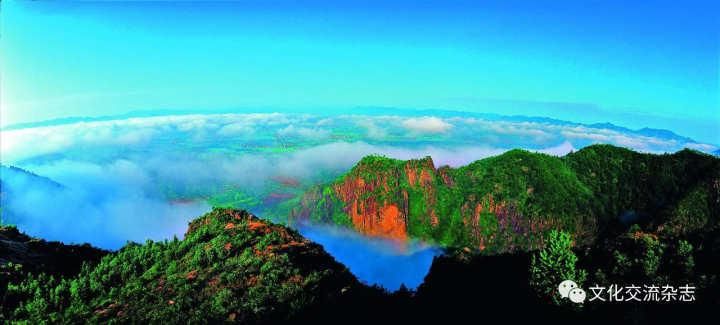As Mount Tiantai is near the sea, the scenic magnificence of the mountain area naturally includes the beauty of the sea, which appealed to the Tang romanticists and gave them lots of inspiration. “Sea” is mentioned in many poems of the Tang, either in a purely romantic tone by Li Bai or in a more realistic manner by Du Xunhe. Monk Jiaoran even shared his theory with his friend about the right timing of capturing the most beautiful moments of the sea. The best time to admire the seascape is when the sunset glow is fading, he advised.
The sheer height of the mountain impressed Li Bai and Cai Xiyi, the latter “complaining” that “the mountain is so close to the heaven that it is too elusive for earthly existence”.
The mountain area is strewn with cascading waterfalls in varying styles. Cao Song’s Tiantai Waterfalls describes the colors of the waterfall spectacle as the summer snow and compares the power of the waterfalls with spring thunders. The mountain’s waterfall vista is represented by the scenery in Shiliang, where the waters are set in an awe-inspiring backdrop of a weather-beaten stone bridge built treacherously in between two cliffs.
In sharp contrast to the ghostly waterfalls and cloud-clad cliffs is babbling crooks streaming down valleys and meandering in the depths of forests. It is easy to imagine how the poet Xu Ning was carried away when taking a random walk in breathtakingly beautiful scenery under the moonlight. “Beautiful waters are everywhere,” Xu Hun wrote in his poem that vividly describes the mesmerizing beauty of the Lingxi River in the Tongbai Mountain, part of Mount Tiantai region.
Mt. Tiantai is the birthplace of the Tiantai sect of Buddhism and the South sect of Taoism, with the core doctrines put together by Master Monk Zhizhe in his years living up in the mountain. Jia Dao and Zhou He, both known for their poetry, were also reverent monks. Buddhism and Taoism is therefore a very important theme in the “Tiantai poetry” of Tang. In many poems depicting the landscapes of Tiantai, readers today can find many clues suggesting the friendship and interaction between the Tang men of letters and religious people.

文章插图
天台云雾
Poems about Tiantai also show the poets were enchanted by the architectural charm in the mountain area. The Guoqing Temple, together with the dainty grace of its surroundings, was an endless source of inspiration to poets. The pine forests that stretched miles in front of the main entrance of the temple made their way into poems by Li Bai, Jia Dao and many others. The nocturnal tranquility and mystic atmosphere enriched by the moonlight filled the heart of Liu Shaoyu with enormous solace and soft sentiment. “The wind sweeps across the dense leaves, as if a celestial being is wandering around...and all the anxieties in me disappear...” he wrote.
Taoism is an important part of the “Tiantai poetry” of Tang, as can be seen in the poems by Meng Haoran, Zhou Pu, and Zheng Xun.
- 镇元子连如来也不怕,为何观音降临五庄观,镇元子吓得当场起立
- 孙悟空一个筋斗十万八千里,为何不背着唐僧,原因是背不动
- 封神演义被度化到西方的孔宣在800年后到底为何要吞了如来佛祖
- 宝玉梦中大喊:不要金玉良缘,只要木石姻缘,宝钗听完为何怔住了
- 西游中龙族的身份地位为何如此之低?看看泾河龙王自己说了啥?
- 他是天界大神,与太上老君齐名,为何最后却沦落到给雷音寺看大门
- 封神榜三位圣人的实力那个最强,为什么元始天尊成为最后的赢家?
- 悟空为何定要打死白骨精?哪怕会被唐僧念咒,火眼金睛发现一秘密
- 牛家村为何被戏称为宇宙中心?射雕里的大神几乎都来过
- 独眼龙高中状元,乾隆却说独眼岂可登金榜,他答出下联成为探花
